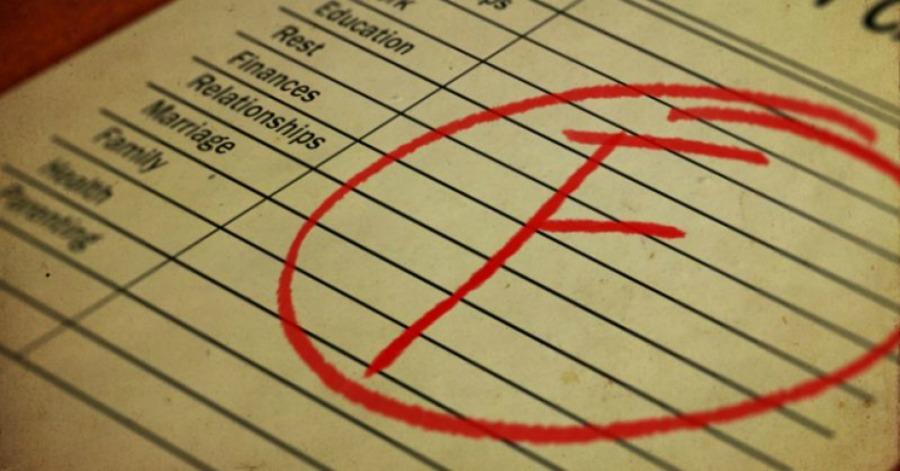Grading the graders
A case for student evaluations of teachers
On a daily basis students are graded on the efforts they make to learn the information provided to them by a teacher, but what if the information isn’t fully given? Or what happens if the materials students were “taught” weren’t thoroughly or correctly explained by their teacher? A teacher’s job is to teach their students information and then test the students on how well they understood the lesson taught, although there are teachers who don’t do their job as they should.
If a teacher doesn’t make an effort to teach his or her pupils, how are the students expected to make an effort to learn? Most students, in the course of 13 years of school, have had a teacher (or many teachers) who is close to retirement or doesn’t have an SOL test for the course he or she is teaching and as a result, the teacher fails to teach his or her students appropriately. Although the teacher slacks when it comes to teaching in the classroom, he or she never fails to regularly test on the material that the students should be learning and grades his or her students’ work as if the material was thoroughly taught.
Top students have been reduced to tears after receiving test scores because the grade they received is not satisfactory. Some teachers will see their “A” students fail and immediately know that something wasn’t right with the lesson. These teachers will normally take partial blame after realizing that most students did not perform well on the test and try to help the students as much as needed. Other teachers, however, place full blame on the students and deny any fault in their students’ failing grades. The efforts that teachers put forth are normally reflected in his or her students’ grades and if the effort is absent, the passing grades are too. Students are graded on their efforts, and the grades they earn follow them all throughout high school and on to college. Why aren’t teachers graded for effort in the same way?
The most common question asked in any class is, “When am I ever going to use this in life?” This question is normally followed by a teacher’s drawn out explanation of when and how the lesson will be used. Normally, a teacher’s explanation makes sense to students which makes the students appreciate all that they are taught just a little bit more. If both the student and teacher make an effort, the material can be retained and the student will be able to recall the lesson later on in life and apply it. But, if either the student or the teacher does not put forth effort, how can the material be used later on in life?
Principals are evaluated by the teachers who work under them, so why aren’t teachers graded by the people working under them as well–their students? While all teachers are required to be evaluated by the principals using a state-wide mandate with various categories, the question still remains: are these evaluations truly grading the efforts made by teachers? The mandate consists of 7 categories: Professional Knowledge, Instructional Planning, Instructional Delivery, Assessment Of and For Student Learning, Learning Environment, Professionalism, and Student Academic Progress. While all of these categories combined hold teachers to a standard, the teachers know these categories and are able to scrape through passing them with the bare minimum requirements. It would be better for the teachers to be uncertain of their final “grade” so they have to continuously work hard.
My suggestion is to allow the students to collectively evaluate each of their teachers on how well the teacher provided, taught, and tested material in class. Compose a survey, such as the surveys dispersed to students who are taking a dual-enrollment course, which give students categories to grade their teachers on based on a 1-5 grading scale. In most colleges, each professor is graded by his or her students to ensure that the teacher is up to standards. A high school education is the only education some people receive during their lives; therefore, couldn’t it be agreed upon that high school teachers be upheld to the same high standards that college professors are held to?
Although some students may use this as a weapon against teachers they don’t like, there are usually between 20-30 students in each class. One student’s bad evaluation should not effect the teacher’s final average if the rest of the class respects the teacher and feels as if they are thoroughly being taught the provided material.
Teachers who work hard to teach their students and genuinely care for them would not dismiss these evaluations because the surveys can bring no harm to them, only praise.
Yes, there are students who slack off and don’t try, but yes, there are also teachers who slack off and don’t try as well. It is time for the students to have a right to evaluate the teachers hired to teach the leaders of tomorrow if they aren’t putting forth the effort students deserve.
Your donation will support the student journalists of Tunstall High School. Your contribution will allow us to purchase equipment and cover our annual website hosting costs.

Abby Scarce is a senior and this is her second year on the newspaper staff. Last year, Abby was recognized by the Best of SNO for her opinion article,...










